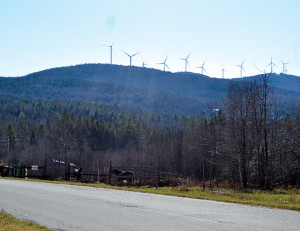One thing is certain about energy policy in Vermont: it violates the rights of everyone involved, producers and consumers alike. In its drive to promote “green energy” the Vermont government uses force to compel utilities to buy increasing amounts of energy from renewable sources, paying over market rates, often double or more, in the process. This of course translates to higher electricity costs to consumers with Vermonters pay about 30% more than the national average for electricity.
Compounding these abuses is the fact that the state of Vermont, as well as the federal government, offer subsidies to those who construct renewable energy projects which means higher spending, likely contributing to the ~$100 million shortfall in this year’s budget, and higher taxes, which helps make Vermont one of the least attractive states (ranked 45th in 2014) for businesses. These subsidies not only pass a significant portion of the cost of these projects on to all tax payers, they also, along with the mandates mentioned above, lead to money being invested in projects that would not otherwise be considered. This money is then not available for projects that would actually be profitable.
Even if a project escapes the rights violations described above, they cannot escape those required to obtain a permit. Part of this process is seeking a “certificate of public good .” Recently a neighbor decided to add additional solar panels to his property and as part of the process of obtaining such a certificate he had to send notices to all the adjoining property owners so they would have the opportunity to complain and potentially block the project. It will not surprise anyone who follows my blog to know how offensive I find it that a property owner has to beg for permission to use his own property in a way that does no damage to anyone else’s.
Part of the permitting process, an early part as I understand it, is submitting the proposal to a regional planning board to see if it meets the requirements of the “regional energy plan.” Those projects which do not meet the requirements are not built. In my part of Vermont, the Northeastern Vermont Development Agency determines the regional energy plan and recently the board of directors announced a change to that plan. According to the March 28 Caledonian Record:
It is the position of NVDA that no further development of industrial wind energy complexes should take place in the Northeast Kingdom. This position will become an element in the regional energy plan.
…
The clear benefit is the tax relief that industrial wind complexes bring to their host towns. The clear problem is the bitter divisions that wind brings to our communities.
It would be difficult to determine from the above if the NVDA board why they are opposing such projects. Does the board believe that we should build such sources of energy and the state should require that Vermonters buy energy from them but the members of board simply don’t want to have to look at them? Or do they think such projects do not have sufficient (any?) benefits that outweigh their costs? From the section of their statement that first caught my eye it does not appear that NVDA agrees with the environmentalists. Again from the Caledonian Record:
The statement cites, “the unreliability of wind energy, the amount of energy produced versus the social and environment disruption, the costliness of the electricity and the dubiousness of the claims of environmental benefit.”
Despite its somewhat woozy wording, what exactly is “social and environmental disruption,” it is startling to see any government body, in Vermont of all places, dispute the utopian claims made by green energy advocates and actually looking at the downsides to such systems.
When I first read the article about the change in the energy plan I thought it was a good thing. After all, if these projects cannot make it past the planning commission, they cannot be built and cannot inflict all the rights violations described above. The more I thought about it though, the more I came to realize that this decision further violates the rights of individual property owners and developers.
With this decision the NVDA effectively prevents any property owner from erecting a large-scale wind farm in the Northeast Kingdom. It does not matter if the property owner decides that such a project is the best use of his property. The final sentences quoted above make clear that for the NVDA, as for most government officials, the primary unit of concern is the public, the collective. They cite benefits and harms that affect the town, but ignore those of the property owner. In their view, if planning board must sacrifice the rights and desires of the individual to the public good, well, so be it.
In a proper society, the government would have no role in these decisions other than protecting the rights of each individual as an individual. The government would not offer any subsidies for such projects nor mandate any particular mix of energy in the system. They certainly would not be imposing price controls. If an individual wants to build a wind farm, or solar array, on his property, he needs the freedom to do so as long as such a project does not actually harm others, i.e. does not violate the rights of others. Lacking any such rights violations, neither neighbors nor some vaguely defined community should interfere.
Under such a system we would all enjoy freedom to use our own property as we see fit without the need to run to local bureaucrats for permission while at the same time we would pay the best, cheapest, price for energy. Both of these would allow each individual the best opportunity possible to become prosperous and successful.

